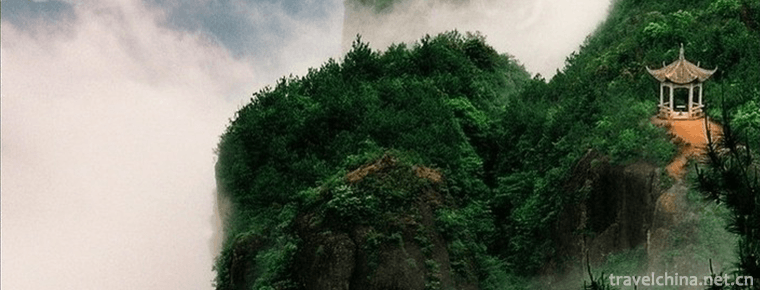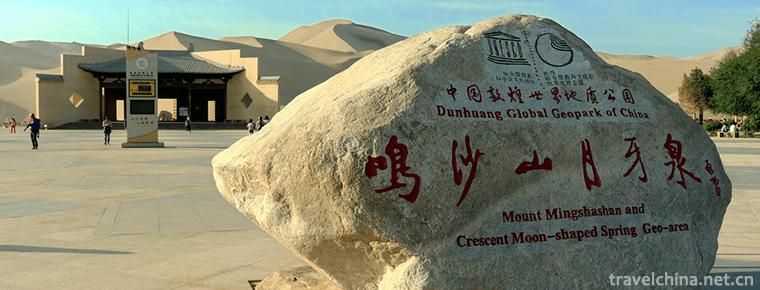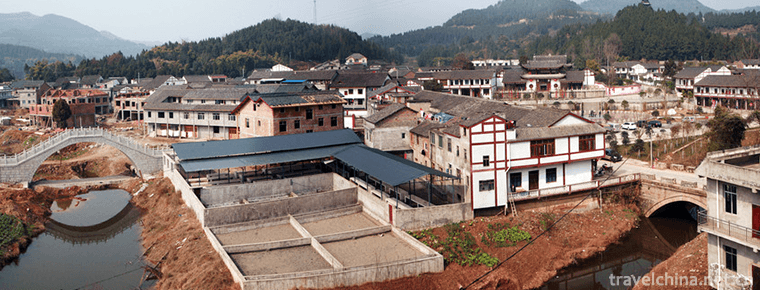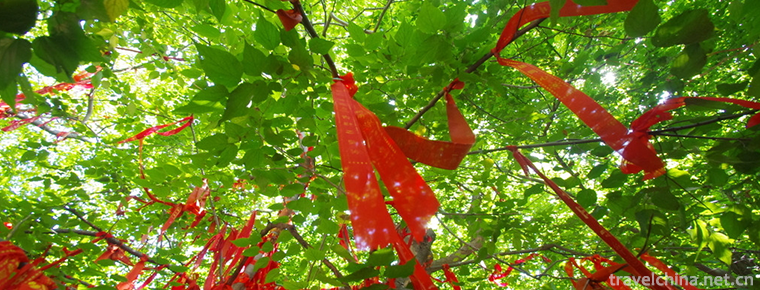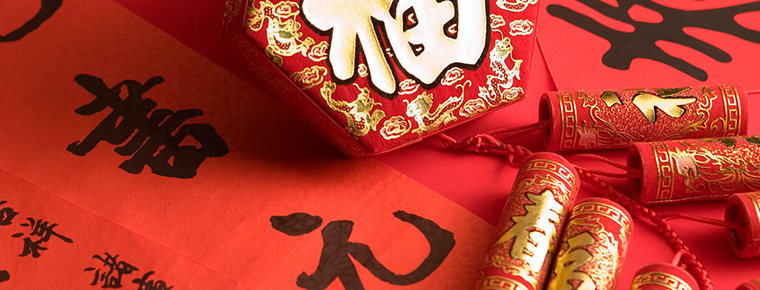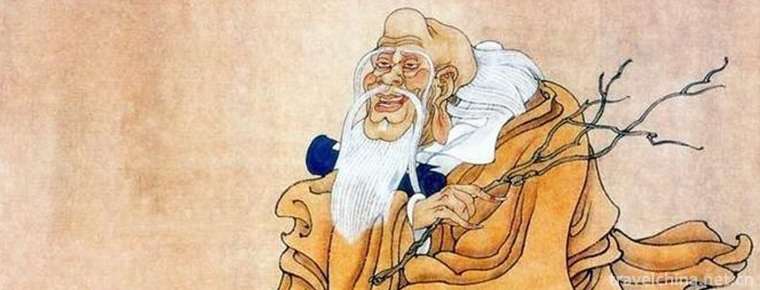Qiyang minor
Qiyang minor
Qiyang in the north of Yongzhou is a kind of traditional opera widely spread. After a long period of evolution and development, it has formed a traditional folk art form with strong local color, which has words and songs, integrated words and songs, complete structure and beautiful melody, and a combination of talking and singing and rap and singing. People usually call it "Qiyang minor".
In 2011, Qiyang Minor, declared by Qiyang County, Hunan Province, was approved by the State Council to be included in the third batch of national intangible cultural heritage lists.
historical origin
Qiyang minor is a traditional opera in Hunan Province. It is popular in Qiyang, Qidong, Lingling and Hengyang of Hunan Province. According to the records of Qiyang County in the Qing Dynasty, it was popular among the people in the Ming and Qing Dynasties. Earlier, the Xiangjiang River, which flows through Qiyang County, was divided into North and South schools. In the south of the Xiangjiang River, there were mainly southern schools singing silk string minor, with exquisite style. In the north of the Xiangjiang River, there were northern schools singing lantern minor, with rough style. Later, they merged in the process of interaction and influence. In the early period of Qiyang minor, singing was the only form, but later it gradually developed into a combination of singing and rap. Generally, singing was performed by one person and accompanied by one person. There were also singing forms such as male and female duet, sitting, walking and singing while dancing. There are more than 300 tunes in Qiyang minor, each with its own brand name. They are often sung and loved by the masses, such as , , , , [a piece of silk]. The lyrics are usually seven-character sentences, four sentences and one section; there are also five-character sentences and long and short sentences of lyrics. In the past, only one tune was used for each track. In order to meet the needs of ideological content and emotional expression, a set of tunes using several tunes appeared. The accompaniment instruments are Erhu, Yueqin, Sanxian, Yangqin, Pipa and other stringed instruments, and the dishes and cups that the singer joins by himself. Sometimes the flute, Suona and some percussion instruments are also used. The new catalogue includes "Brother and Sister Production" and so on. Qiyang minor, also known as Qiyang minor, originated from Qiyang County, is one of the influential local dramas in Hunan Province. It is popular in Hunan and Western Hunan. There are Yonghe and Baohe schools, Gao, Dang and Kun three kinds of singing tunes. Qi opera has words and songs, integrated structure, beautiful melody, combination of speaking and singing, obvious local color, stable style and melody. The singing tune belongs to folk form, sentence. There are one kind of regular sentences, seven words for one sentence, four sentences for one paragraph, and the other is irregular sentences. They are more free and flexible. They are widely circulated, such as "Four Seasons Blossom", "October Blossom", "Three Cups of Wine" and "Noisy Five Gentlemen". The theatrical circles are known as "the world's opera comes out of Qiyang".
The Organizational Department of the Municipal Party Committee held a grand performance on the theme of "July 1st" celebration and organizational system "stressing Party spirit, emphasizing morality and setting an example" in Yongzhou Hall. There are 18 literary and artistic programs in all counties, districts and municipal units in the city. There are 1 first prize, 2 second prize and 3 third prize. Qiyang Small Regulation Project "New Appearance of Huimin Policy" selected by the Organizational Department of the County Committee of our county won the third prize.
"New Appearance of Huimin Policy" shows the new achievements of Party building and grass-roots organizations in Qiyang rural areas in the form of rap and performance, as well as the new features brought to farmers by the Party's Huimin Policy. The whole program highlights local characteristics, distinct themes, popular content, funny and humorous, strong ideological, artistic and local characteristics, and has won unanimous praise from leaders and audiences. And bursts of applause.
Qiyang minor is the most popular local folk art in southern Hunan. Its formation has a great impact on local music culture, and also has a wide impact on the music culture of the whole province. Qiyang minor is a folk art form with strong local color in southern Hunan, which is mainly composed of singing, music combination, rap and singing combination, singing accompaniment combination and beautiful melody.
According to the records of Qiyang County in the Qing Dynasty, it was popular among the people in the Ming and Qing Dynasties. Earlier, the Xiangjiang River, which flows through Qiyang County, was divided into North and South schools. In the south of the Xiangjiang River, there were mainly southern schools singing silk string minor, with exquisite style. In the north of the Xiangjiang River, there were northern schools singing lantern minor, with rough style. Later, they merged in the process of interaction and influence.
The form of Qiyang minor has a long history. From the end of Qing Dynasty to the beginning of the Republic of China, to 2015, many famous artists appeared. In 1956, Qiyang minor artist Zhu Dunxiang performed "Wugeng Liulang" and "Brothers and Sisters Production" in a folk art show held in Beijing, with good results. Qiyang minor has been compiled into the Encyclopedia of China in 1982 as a national musical genre.
Representative Works
Qiyang minor is a kind of traditional folk art form with strong local color, which has words and songs, integrated structure and beautiful melody, and a combination of speaking, singing and rap. Qiyang minor is popular all over Qiyang, especially in Chengguan, Civilization Shop, Lijiaping, Yangjiaotang, Panjiabu, Xiaojiacun, Guanyin Beach and other places. Its music cards are very rich, about 300. Spreaded widely are "Four Seasons Blossom", "October Blossom", "Three Cups of Wine", "Asking for Money", "Picking Vegetable Moss", "Giving Golden Flowers", "Walking Style", "Five Gentlemen Staying Lang" and "Make Five Gentlemen" and so on. Its lyrics belong to folk song style, and its sentence structure forms are: one is regular sentence, seven-character sentence, Four-Sentence paragraph, or five-word sentence, Four-Sentence paragraph; the other is informal sentence, composed of long and short sentences, flexible and free lyrics, and more oral language. But regardless of the structure, the rhythm is clear. The structure of the melody is mostly a paragraph, consisting of two or four phrases. Among them, there are singing without saying, singing with rhyme and white combination, like free-style small fast board type, there are individual by A, B two-part body composition. The singing form of Qiyang minor is small and flexible. It is usually accompanied by one singer with little movement, mainly depending on facial expression. There are also two men and women singing and dancing, which is interesting and lively. Because Qiyang Minor has its own unique style, it has been listed as a national music in the Encyclopedia of China in 1982.
Traditional repertoire
"Can't sing Qiyang". All 13 districts (towns) in the county have the spread of Qiyang minor. Among them, Chengguan, Civilization Shop, Lijiaping, Yangjiao Yi, Panjiabu, Xiaojiacun, Guanyin Beach and other districts (towns) are more common. Qiyang minor is rich in music cards, about 300. The popular tunes are "Four Seasons Flowering Day", "October Blossom", "Three Cups of Wine", "Asking for Money", "Picking Vegetable Moss", "Giving Golden Flowers", "Walking Tune", "Five Gentlemen Staying Lang", "Noisy Five Gentlemen" and so on.
artistic characteristics
sentence structure
The lyrics in Qiyang minor belong to the people's form, and the sentence structure forms are as follows: one is a regular sentence, seven words are a sentence, four sentences are a paragraph, there are five sentences, four sentences are a paragraph; the other is an irregular sentence, composed of long and short sentences, flexible lyrics, free, multi-use oral language. But no matter what kind of structure, their rhythm is very clear.
Tune structure
Most of the melodic structures are monolithic. It consists of two phrases as a paragraph, or four phrases as a paragraph. Some of them are singing or not, some are composed of singing and rhyming, others are like free allegro, and some are composed of A and B.
Singing Form
The singing form of Qiyang minor is small and flexible. It is usually accompanied by singing and playing the piano by one person. The movements are not big, mainly depending on facial expressions. There are also two men and women singing and dancing, and they are funny and active. After liberation, performing singing, group singing, detour performance and other forms appeared in singing.
In terms of the number of performers and the form of performance, "Qiyang minor" has changed greatly in different periods, from singing by one person in the early stage to singing by two or more people today. In the early stage, the number of singers was small and relatively single, and it was completely completed by a man. A man sings two voices, male and female, playing different roles of men and women. In singing, the actor's voice is high and low, and different roles of men and women are created by the change of voice's high, low and true. Artists who sing "Qiyang minor" have strong performance ability, rich expression, vivid image, humorous and good at funny.
Accompanied instruments
String music is the main accompaniment instruments, such as the second suction, the moon piano, the three strings, the dulcimer, the pipa, the paper beard and so on. Suona, bamboo flute and appropriate percussion instruments are also added. In singing, performers often use props such as small ceramic dishes, cups or spoons, accompanied by the rhythm of the music, singing while striking, with the performance, which is very distinctive.
Inheritance Significance
Compared with Qi Opera and Peking Opera, the development history of Qiyang minor is slightly ordinary, and the performance system is not as complete as Qi Opera. But its value is not small. The situation of Qiyang minor, like the folk music in many parts of China, is in decline and on the verge of losing its transmission.

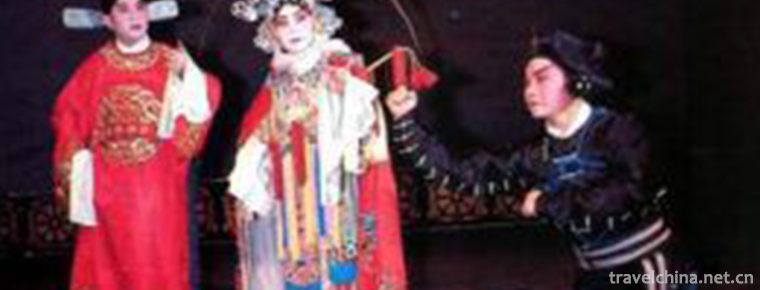
-
ShenxianjuImmortal residence
Shenxianju, a famous ancient mountain, is also known as Weiqiang Mountain. Now it is a national 5A scenic spot. There is the title of He Shu's calyx in Qianlong period of Qing Dynasty.
Views: 211 Time 2018-12-07 -
Mingsha Mountain Crescent Spring Scenic Area
Mingsha Mountain Crescent Spring Scenic Spot is located 5 kilometers south of Dunhuang City, Gansu Province. It covers an area of 312,000 square kilometers.
Views: 80 Time 2018-12-12 -
Langzhong Tiangong Courtyard Fengshui Cultural Scenic Area
Tiangongyuan Fengshui Cultural Scenic Area is located in Tiangong Township, southwest of Langzhong City, 29 kilometers away from the urban area, covering an area of more than 10 square kilometers.
Views: 117 Time 2019-01-29 -
Tsing Tan Temple
Qingdan Temple is located 3.5 kilometers west of Fucheng, Zaozhuang City, in the narrow valley of Chu and Han Mountains. It was built in the Tang Dynasty..
Views: 191 Time 2019-02-07 -
Wuhan Haichang Polar Ocean World
Wuhan Haichang Polar Ocean Park is the first Ocean Park constructed by Haichang Group in central China. It is the fifth large-scale theme park covering the concept of polar and ocean.
Views: 182 Time 2019-02-24 -
Spring Festival
The Spring Festival, the Lunar New Year, is the first year of the year and also the traditional "New Year's Day". Commonly known as New Year, Spring Festival has a long history.
Views: 178 Time 2019-04-22 -
Laozi legend
Laozi is the incarnation of Laojun. The fifteenth day of February in the lunar calendar is a major Daoist festival. It is the "Christmas" of the emperor. Lao Tzu, the word Boyang.
Views: 204 Time 2019-05-11 -
Anhui Science And Technology University
Anhui Science and Technology University is located Anhui Province Chuzhou City Fengyang County and Bengbu City By the state Ministry of Education Approved full-time full-time undergraduate universitie.
Views: 187 Time 2019-10-10 -
Former residence of Wu Yuzhang
Wu Yuzhang's former residence is located in group 6, caijiayan village, Shuangshi Town, Rong County, Zigong City, Sichuan Province. It is 14km away from the county seat and 32km away from Zigong City..
Views: 167 Time 2020-10-15 -
Fobao ancient town
Fubao ancient town is an ancient town with a long history in Hejiang County, Sichuan Province, 42 km away from Hejiang County, Sichuan Province. It is a historical town, a famous cultural town, a tourism town, and an important business town in the junction of Sichuan, Guizhou and Chongqing. It was built in the late yuan and early Ming Dynasty, more than 600 years ago, it is named Fobao, and it is the gateway of national Fobao forest park..
Views: 143 Time 2020-10-16 -
Meishan special food
Meishan traditional delicacies and specialties include: sugar and oil fruit, spicy sausage, Sichuan fried spring rolls, Dongpo bean curd elbow, stone bean curd, Dongpo cuttlefish, Dongpo sausage, sweet potato sugar, Meishan Qiao Jiao beef, yameizi so.
Views: 242 Time 2020-12-18 -
Yibin water resources
Yibin city produces 614500 cubic meters of water per square kilometer per year. In addition to the amount of water from various rivers in the city, the city has a total annual water volume of 242.84 billion cubic meters, and the average annual water occupatio.
Views: 359 Time 2020-12-18
